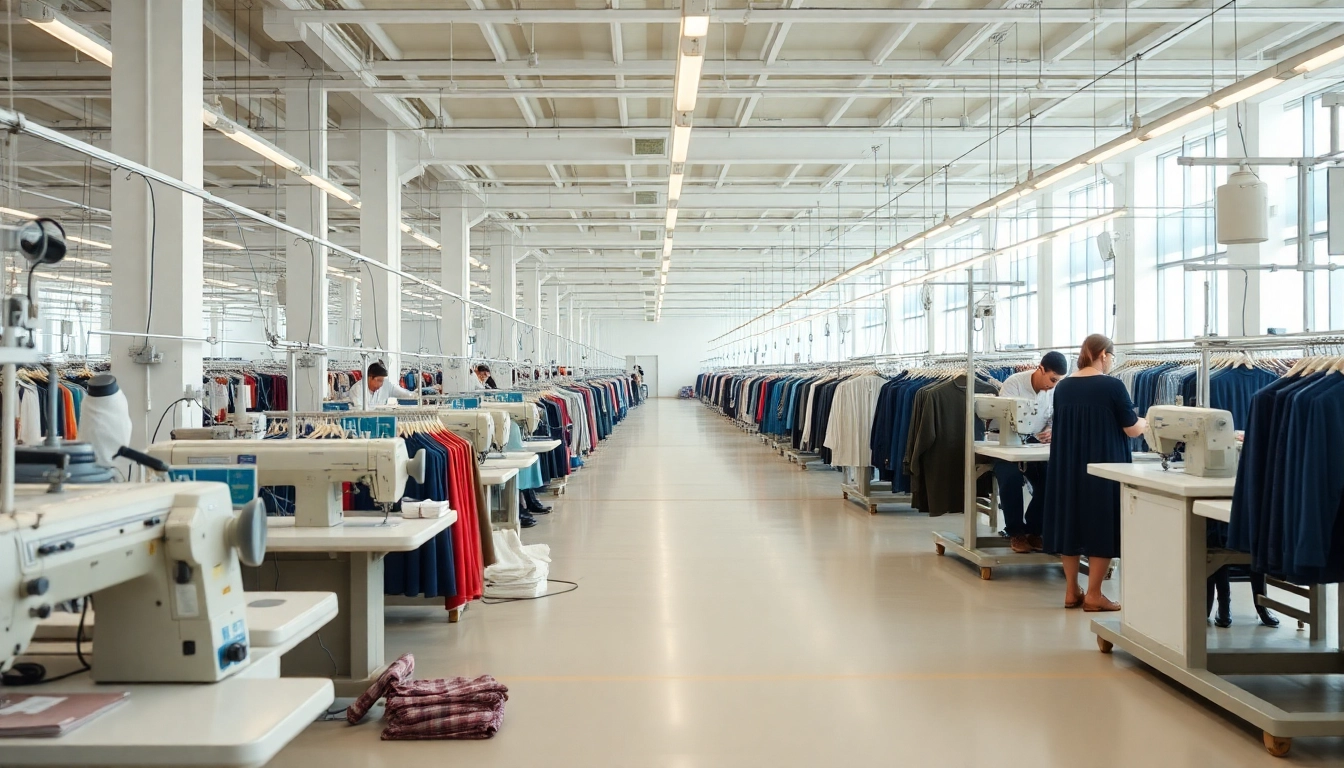Understanding the Role of Clothing Manufacturers in the Sportswear Industry
Definition and Scope of Clothing Manufacturing
Clothing manufacturing encompasses the entire process of designing, producing, and distributing garments, ranging from casual wear to high-performance sports apparel. This industry plays a vital role in transforming raw fabrics into finished products that meet specific quality, functionality, and design standards. Clothing manufacturers operate at various stages, including fabric sourcing, cut and sew production, printing, embroidery, and packaging. Their scope extends beyond simple assembly to include innovations in materials, sustainability practices, and customization capabilities. For brands seeking to stand out in competitive markets, collaborating with a reliable Clothing Manufacturers becomes essential to ensure product excellence, timely delivery, and adherence to brand identity.
In the sportswear industry, especially, manufacturers are tasked with producing garments that combine aesthetics with technological performance, demanding precision and expertise in each stage of production.
Importance of Customization and Private Label Services
Customization and private label services are at the forefront of modern clothing manufacturing, empowering brands to create unique identities in a crowded marketplace. Private labeling allows brands to self-brand their products without investing heavily in manufacturing facilities, thereby reducing risk and increasing flexibility. Customization options like fabric selection, color schemes, cuts, branding, and embellishments transform generic apparel into distinctive products tailored to target audiences.
For sportswear brands, customization enhances brand loyalty and offers a competitive advantage by delivering products that precisely align with athletes’ performance needs and aesthetic preferences. Whether it’s personalized team uniforms, activewear aligned with specific sports, or casual athletic apparel, private label services facilitate innovation while maintaining quality standards.
Key Features of Reputable Clothing Manufacturers
- Low Minimum Order Quantities (MOQs): allows startups and small brands to order without excessive inventory risk. Leading manufacturers like Extreme Sportswear in Pakistan offer MOQs as low as 50 pieces per style.
- Advanced Technology: state-of-the-art equipment such as sublimation printers, laser cutting, and automated sewing machines ensure high-quality, consistent output.
- Customization Flexibility: comprehensive in-house services for printing, embroidery, and fabric development give brands full creative control.
- Sustainable Practices: eco-friendly manufacturing processes, use of organic fabrics, and waste reduction initiatives demonstrate social responsibility and appeal to environmentally-conscious consumers.
- Timely Delivery and Reliability: streamlined supply chain operations guarantee on-time shipments, critical for brand launches and sporting events.
Why Choose a Specialized Sportswear Manufacturer in Pakistan?
Advantages of Pakistani Manufacturing for Sports Apparel
Pakistan stands out as a global hub for sportswear production due to its strategic advantages. The country boasts a robust manufacturing infrastructure, skilled labor force, and proximity to major markets. Brands prefer Pakistan for its ability to deliver high-performance sports apparel at competitive wholesale prices, enabling larger profit margins or competitive retail pricing.
Additionally, Pakistani manufacturers are increasingly adopting international quality standards, integrating the latest manufacturing technologies, and embracing sustainable practices to meet global demands.
Quality Standards and Technological Capabilities
Leading Pakistani sportswear manufacturers maintain stringent quality control protocols, including ISO certifications and compliance with international standards for textile safety and environmental impact. They employ advanced machinery such as computerized cutting tables, high-speed embroidery machines, and high-resolution sublimation printers. This ensures garments are durable, breathable, and functional, meeting the rigorous demands of athletes.
Cost Benefits and Minimum Order Quantities
One of Pakistan’s biggest advantages is its ability to produce quality garments at significantly lower costs than many Western countries. Competitive labor costs and economies of scale enable manufacturers to offer attractive prices. Furthermore, low MOQs—often just 50 pieces per style—make it feasible for startups and emerging brands to enter the market without prohibitive investment.
Core Services Offered by Top Clothing Manufacturers
Cut & Sew Production and Fabric Selection
The foundation of high-quality sportswear lies in precise cut and sew processes combined with careful fabric selection. Reputable manufacturers offer extensive fabric options—including polyester, nylon, spandex, and sustainable organic blends. Skilled technicians ensure accurate pattern cutting, seam joining, and finishing, resulting in garments that fit well and withstand rigorous use.
In-house fabric development further enhances customization, allowing brands to specify weight, moisture-wicking properties, and stretch features suitable for various sports.
In-House Printing, Embroidery, and Customization Options
To create distinctive apparel, top manufacturers utilize in-house printing techniques such as sublimation, screen printing, and digital direct-to-garment printing. Custom embroidery adds a premium touch, with digitizing services translating logos into vibrant, durable decorations. These in-house capabilities ensure quality control, faster turnaround, and flexibility for small or large batches.
Additional customization options include label printing, patches, reflective trims, and functional technological embellishments for performance enhancement.
Quality Control, Packaging, and Timely Shipment
Rigorous quality control processes, including inspection at every stage, prevent defects and ensure compliance with client specifications. Final garments are meticulously folded, packaged in eco-friendly or branded packaging, and shipped promptly via reliable logistics partners. Most manufacturers prioritize timely delivery to support product launches, seasonal collections, and sporting events.
How to Select the Best Clothing Manufacturer for Your Brand
Assessing Manufacturing Capabilities and Experience
When choosing a manufacturing partner, evaluate their portfolio, client testimonials, and experience handling similar apparel categories. A detailed understanding of their facilities, technological investment, and capacity for large-scale production is essential. Leading companies like Extreme Sportswear demonstrate extensive expertise by serving over 3,000 brands globally and offering low MOQs.
Sample Process and Quality Assurance
Requesting samples before large orders ensures alignment with your quality standards and design expectations. A reputable manufacturer provides prototypes within a short timeframe and is transparent about quality assurance procedures, including fabric testing, colorfastness, and construction durability.
Pricing, MOQs, and Long-term Support
Compare pricing models, considering freight costs, custom charges, and minimum order quantities. Long-term support services like ongoing communication, flexible reorder policies, and product updates can significantly impact your supply chain stability.
Emerging Trends and Sustainable Practices in Clothing Manufacturing
Eco-Friendly Materials and Manufacturing Processes
Sustainability is transforming apparel manufacturing. Manufacturers are adopting organic and recycled fabrics, reducing water and energy consumption, and implementing waste recycling systems. Brands committed to environmental responsibility can align with manufacturers emphasizing eco-friendly practices, such as using biodegradable dyes and eco-conscious packaging.
Technological Innovations for Better Customization
Digital knitting, 3D patterning, and augmented reality sampling are reshaping product development. Such innovations enable rapid prototyping and personalized designs, allowing brands to respond swiftly to market trends and consumer preferences.
Aligning Brand Values with Sustainable Manufacturing
Consumers increasingly favor brands with strong sustainability commitments. Partnering with manufacturers who share these values enhances brand image and helps meet global certifications like Fair Trade, Global Organic Textile Standard (GOTS), and others.



